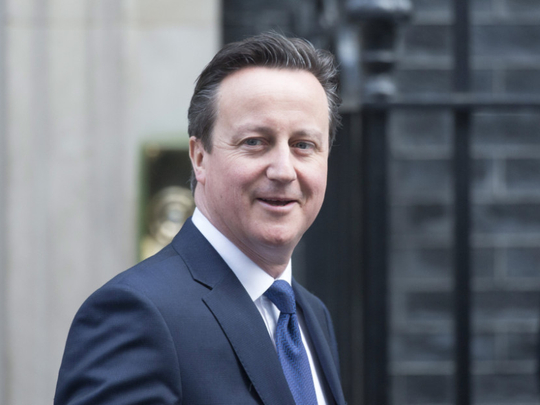
When British Prime Minister David Cameron announced his intention to hold a referendum on European Union (EU) membership two years ago, it caused multiple headaches for other European governments: The prospect of a grim and pointless negotiation, followed by British exit. But my impression from recent conversations with thinktanks and officials across the EU is that things are changing. No longer do European governments see this as the time when the United Kingdom leaves Europe.
Instead, they will push Britain to face up to its Europeanness. With the outcome of Britain’s May general election becoming muddier by the day, other governments are growing bolder. They had been preparing for a clear election result, driven by Euroscepticism. No longer. Now they sense an opportunity to challenge the UK’s sense of itself as apart from them, as more special. The confident claim by the European Council president, Donald Tusk, that “the United Kingdom needs Europe”, in an interview with the Guardian last Sunday, is only the latest expression of this shift in mood.
For five years, European governments have been forced to study the UK’s EU debate in detail. Today they feel qualified to guide British voters away from the sometimes self-defeating behaviour of their own political elites. They have also been forced to break a mental taboo and imagine the “Brexit” — a British exit from the EU. It is not just Britain that is now prepared to adopt a take-it-or-leave-it attitude.
Thus countries like Poland or Sweden, which treat the UK as an important voice on economic liberalisation, international affairs and the problems of not belonging to the Eurozone, see a last chance to keep the UK in the EU. But after fending for themselves for the past five years, they are no longer needy. Germany and its more hawkish Eurozone friends see this as a chance to achieve clarity. They have weighed up not just the costs of the UK leaving the EU, but the benefits too.
Tired of British foot-dragging, they are more than ready to scoop up the UK’s old allies in northern and eastern Europe. Tellingly, only France and its southern allies seem open to the UK remaining in the EU in a kind of confused limbo: British navel-gazing is the best means of neutralising northern and eastern Europe, and Germany too. If the British election produces a minority government, a three-party compromise, or a messy combination of the two, the UK’s electoral system will have failed in its primary rationale: to produce strong, stable government. But it will be a very European outcome. Federalism and multi-party politics have been identified in Brussels and by countries like Germany as a way to deal with globalisation and the pressure for political centralisation and economic fragmentation.
Through bitter experience, they know the pros and cons of this setup. In 2010, German politicians, themselves under a conservative-liberal government, were already making overtures to their British counterparts, offering advice. They were rebuffed. This is a freak result, said the British, and we will find our own solutions. The Tories and Lib Dems duly drew up a slapdash coalition agreement in record time, keen to reassure the markets. Well, today Berlin and co will be bolder about offering advice — not so much about domestic coalition formation perhaps, as about the overarching role of the EU in any national federal or multi-party set-up.
They will also press the UK on economic matters. The British debate has increasingly focused on the gulf between a “continental” and an “Anglo-Saxon” economic model, the former associated with high wages but low employment, the latter with low wages but high employment. The feeling in northern and central Europe is that the gulf is artificial: there’s a common desire for efficient welfare spending and high employment.
But European governments also believe Britons stand to benefit more from what the EU economy has to offer. But these governments also believe Britons stand to benefit more from what the EU economy has to offer. Free movement, for instance, is still seen as something that happens to Britons, not something they do. It is all about immigration driving down wages, not emigration boosting worker motivation. Low worker mobility, high personal debt and mediocre education have turned Britons into victims of the EU economy, and have made British thinking deeply unattractive beyond the Channel.
In the coming months, we can expect resistance to a British government renewing its attempts to water down EU free-movement and labour-market rules, or to create banker-friendly EU policies, if these are presented as the means of somehow building public support in Britain. Expect governments also to be more vocal about their reasons. They have long watched, frustrated, as EU economic policies were pilloried by Britain’s Eurosceptic elites, as much on the grounds of their origins as their substance.
Expect them also to press the UK to acknowledge its European geography. The UK has long pictured itself as insulated from world affairs, a long-arm power able to pick and choose the regions it engages in, a financial hub afloat in a fluid global economy. With Britain’s defence review coinciding with discussions in Brussels about the “shared neighbourhood” of Ukraine and Syria, Europeans will be sensitive to signs that Britain is still confusing its own geography with America’s, or Guernsey’s. The tone sounds strident. But what most governments want is really quite sensible: For the UK to recognise those ways in which it is European. That is the only basis for a fruitful discussion about adjusting Britain’s relationship with the EU — or, indeed, deciding how best to part ways.
— Guardian News & Media Ltd
Roderick Parkes is from the Isle of Man and runs the Brussels office of a German think tank. He writes the Super Commuter blog for EU observer.











